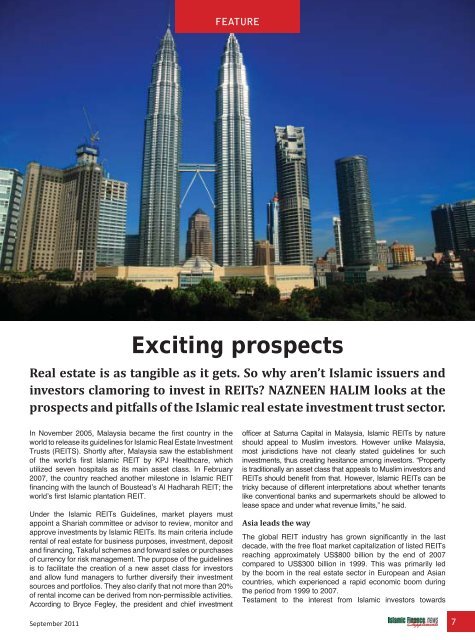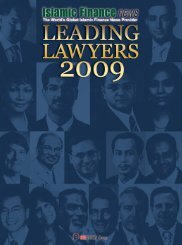Islamic Investor: Islamic Investor: - Islamic Finance News
Islamic Investor: Islamic Investor: - Islamic Finance News
Islamic Investor: Islamic Investor: - Islamic Finance News
You also want an ePaper? Increase the reach of your titles
YUMPU automatically turns print PDFs into web optimized ePapers that Google loves.
FEATURE<br />
Exciting prospects<br />
Real estate is as tangible as it gets. So why aren’t <strong>Islamic</strong> issuers and<br />
investors clamoring to invest in REITs? NAZNEEN HALIM looks at the<br />
prospects and pitfalls of the <strong>Islamic</strong> real estate investment trust sector.<br />
In November 2005, Malaysia became the fi rst country in the<br />
world to release its guidelines for <strong>Islamic</strong> Real Estate Investment<br />
Trusts (REITS). Shortly after, Malaysia saw the establishment<br />
of the world’s fi rst <strong>Islamic</strong> REIT by KPJ Healthcare, which<br />
utilized seven hospitals as its main asset class. In February<br />
2007, the country reached another milestone in <strong>Islamic</strong> REIT<br />
fi nancing with the launch of Boustead’s Al Hadharah REIT; the<br />
world’s fi rst <strong>Islamic</strong> plantation REIT.<br />
Under the <strong>Islamic</strong> REITs Guidelines, market players must<br />
appoint a Shariah committee or advisor to review, monitor and<br />
approve investments by <strong>Islamic</strong> REITs. Its main criteria include<br />
rental of real estate for business purposes, investment, deposit<br />
and fi nancing, Takaful schemes and forward sales or purchases<br />
of currency for risk management. The purpose of the guidelines<br />
is to facilitate the creation of a new asset class for investors<br />
and allow fund managers to further diversify their investment<br />
sources and portfolios. They also clarify that not more than 20%<br />
of rental income can be derived from non-permissible activities.<br />
According to Bryce Fegley, the president and chief investment<br />
officer at Saturna Capital in Malaysia, <strong>Islamic</strong> REITs by nature<br />
should appeal to Muslim investors. However unlike Malaysia,<br />
most jurisdictions have not clearly stated guidelines for such<br />
investments, thus creating hesitance among investors. “Property<br />
is traditionally an asset class that appeals to Muslim investors and<br />
REITs should benefit from that. However, <strong>Islamic</strong> REITs can be<br />
tricky because of different interpretations about whether tenants<br />
like conventional banks and supermarkets should be allowed to<br />
lease space and under what revenue limits,” he said.<br />
Asia leads the way<br />
The global REIT industry has grown signifi cantly in the last<br />
decade, with the free fl oat market capitalization of listed REITs<br />
reaching approximately US$800 billion by the end of 2007<br />
compared to US$300 billion in 1999. This was primarily led<br />
by the boom in the real estate sector in European and Asian<br />
countries, which experienced a rapid economic boom during<br />
the period from 1999 to 2007.<br />
Testament to the interest from <strong>Islamic</strong> investors towards<br />
September 2011 7

















